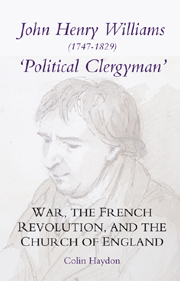 John Henry Williams (1747–1829): 'Political Clergyman'
John Henry Williams (1747–1829): 'Political Clergyman' Book contents
- Frontmatter
- Contents
- Dedication
- Illustrations
- Preface and Acknowledgements
- Abbreviations
- Editorial Note
- 1 The Grave and the Memory
- 2 The Formative Years
- 3 The Ivy-mantled Tow'r: Parish and Pastoralia
- 4 The Gathering Storm
- 5 By Far the Heaviest of All Earthly Calamities: Williams' Anti-War Sermons
- 6 Anxiety, the 1797 Campaign, and Afterwards
- 7 Assessment
- Bibliography
- Index
- STUDIES IN MODERN BRITISH RELIGIOUS HISTORY
4 - The Gathering Storm
Published online by Cambridge University Press: 12 September 2012
- Frontmatter
- Contents
- Dedication
- Illustrations
- Preface and Acknowledgements
- Abbreviations
- Editorial Note
- 1 The Grave and the Memory
- 2 The Formative Years
- 3 The Ivy-mantled Tow'r: Parish and Pastoralia
- 4 The Gathering Storm
- 5 By Far the Heaviest of All Earthly Calamities: Williams' Anti-War Sermons
- 6 Anxiety, the 1797 Campaign, and Afterwards
- 7 Assessment
- Bibliography
- Index
- STUDIES IN MODERN BRITISH RELIGIOUS HISTORY
Summary
High Society
Besides his clerical circle, Williams had friends in Warwickshire's landed society. He was, it seems, always conscious that he himself was a gentleman, with an honourable pedigree. When his mother died in 1800, he conducted the funeral and noted, slightly unnecessarily, in the Wellesbourne parish register ‘Widow of John Williams Esq.’. Williams' education, both at school and university, gave him poise in polite society. He displayed the social graces, sense of honour, and masculine virtues of the landed gentlemen with whom he mixed, and shared their cultural interests, if not all their social and cultural presumptions. Williams might easily socialize with the quality at Warwick or Leamington; and he was comfortable in the drawing or dining rooms of country houses.
Williams understood the concerns of wealthy families partly because he himself owned property and had streams of private income which were independent of the income he derived from his benefices. He seems to have been financially adroit. He inherited lands in Wales, and conveyed these to the Earl of Warwick in exchange for land at Fleet Marston, so that, thereafter, his rectory's glebe constituted one of the largest landholdings in the parish. In 1801, he secured an annuity of €250. Williams gradually acquired a knowledge and the skills of estate management, and sometimes acted as an amateur steward for his friend Bertie Greatheed at Guy's Cliffe. He advised about the rents which could be expected from estate farmers – and Greatheed largely accepted his recommendations.
- Type
- Chapter
- Information
- John Henry Williams (1747–1829): 'Political Clergyman'War, the French Revolution, and the Church of England, pp. 63 - 90Publisher: Boydell & BrewerPrint publication year: 2007
